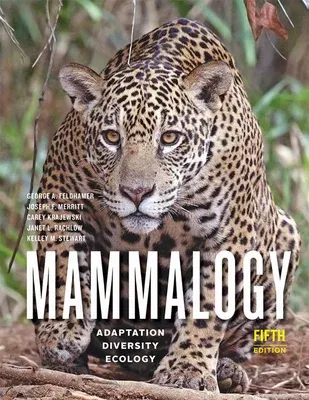A completely revised and updated edition of the leading mammalogy
textbook, featuring color photographs throughout and a new streamlined
structure for enhanced use in courses.
There are more than 6,400 species in the class Mammalia, including the
blue whale--the largest animal that has ever lived--and the pygmy shrew,
which weighs little more than a dime. Such diversity among mammals has
allowed them to play critical roles in every ecosystem, whether marine,
freshwater, alpine, tundra, forest, or desert.
Reflecting the expertise and perspective of five leading mammalogists,
the fifth edition of Mammalogy: Adaptation, Diversity, Ecology
significantly updates taxonomy, adds a new introductory chapter on the
science of mammalogy, and highlights several recently described species.
To enhance its appeal to students, textual material has been reduced,
consolidated, and streamlined without sacrificing breadth or depth of
coverage. The fifth edition includes
- for the first time, stunning color photographs throughout
- chapters rearranged and grouped to best reflect phylogenetic
relationships, with updated numbers of genera and species for each
family
- updated mammalian structural and functional adaptations, as well as
ordinal fossil histories
- recent advances in mammalian phylogeny, biogeography, social behavior,
and ecology, with 12 new or revised cladograms reflecting current
research findings
- new breakout boxes on novel or unique aspects of mammals
- new work on female post-copulatory mate choice, cooperative behaviors,
group defense, and the role of the vomeronasal system
- discussions of the current implications of climate change and other
anthropogenic factors for mammals
Maintaining the accessible, readable style for which Feldhamer and his
coauthors are well known, this new edition of Mammalogy is the
authoritative textbook on this amazingly diverse class of vertebrates.

